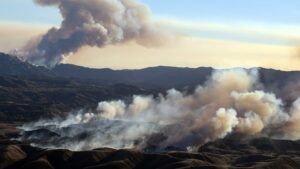The Financial Ripple Effect of California’s Wildfires: What Investors Need to Know
As the ravaging Los Angeles wildfires continue to wreak havoc, sparking urgent concerns for homeowners and investors alike, there’s one question that looms large: What does this mean for the insurance sector?
An Overview of the Crisis
Recent images from the aerial views of the Kenneth fire show it encroaching on residential areas, while the Palisades fire is already making headlines as one of the most destructive of the year. The chaos has led to a sharp sell-off in insurance stocks, with major players like Allstate, AIG, Chubb, and Travelers seeing significant declines. For instance, Allstate saw its shares drop by about 4%, while AIG, Chubb, and Travelers fell approximately 2% in morning trading. This marked them among the biggest losers in the S&P 500 index.
Understanding Insured Losses
According to analysis from financial services giant JPMorgan, the current wildfire crisis could lead to insured losses exceeding $20 billion, a figure that dwarfs the $12.5 billion record set by the 2018 Camp Fire. Moody’s Ratings echoes these concerns, expecting massive insured losses due to the high valuation of homes and businesses in California.
For prospective investors, understanding which insurance companies hold the most exposure to these losses is critical. Allstate, Chubb, and Travelers are identified as the most vulnerable carriers, particularly Chubb, which focuses on high-net-worth clients in the region. Those investing in these stocks should keep a keen eye on developments related to these fires as the situation unfolds.
The Broader Implications for Insurers
With nearly 1,000 structures destroyed and more than 17,000 acres burned in the Palisades Fire alone, insurers are increasingly concerned about their exposure and are calling on Southern California Edison to preserve evidence related to the wildfires. Such moves are essential in determining liability and navigating potential claims.
Moreover, reinsurers such as Arch Capital Group and RenaissanceRe Holdings have started to feel the impact, with declines of 2% and 1.5% respectively. Rising loss estimates increase the likelihood of exceeding reinsurance contract limits, dramatically heightening market volatility and investor caution.
What Investors Should Consider
-
Review Exposure: Investors holding shares in any of the prime insurers should reassess their exposure to the California housing market. The changing dynamics due to climate-related disasters may necessitate portfolio adjustments.
-
Long-term vs. Short-term Strategies: Understand whether your investment strategy aligns with the potential for long-term recovery or if you need to react quickly to short-term market fluctuations.
-
Monitor Local Policies on Wildfires: As climate patterns become increasingly unpredictable, state and local policies addressing wildfire prevention and response will heavily influence the insurance market. Being informed on legislative measures can provide insight into potential impacts on insurance stock performance.
-
Diversity and Risk Mitigation: Investing solely in insurance stocks tied to high-risk areas can be precarious. Evaluation of sector diversity is crucial; consider broadening your investment portfolio to mitigate potential risks associated with disasters unique to certain geographic areas.
- Observe Historical Trends: Historical data on insurance performance post-natural disasters can provide valuable context. Investors should look at how shares in these companies have rebounded in the past to better guide their decisions moving forward.
Conclusion
The catastrophic wildfires sweeping through Los Angeles serve as a potent reminder of the risks inherent in climate volatility and its direct impact on investment portfolios. At Extreme Investor Network, we are dedicated to bringing you insights that illuminate market trends, focusing on ways to navigate these turbulent waters. Stay connected as we continue to unpack the developments and provide actionable insights for keen investors.
In investing, as in nature, the best defense is often a robust offense. Equip yourself with knowledge and remain vigilant in these uncertain times.

